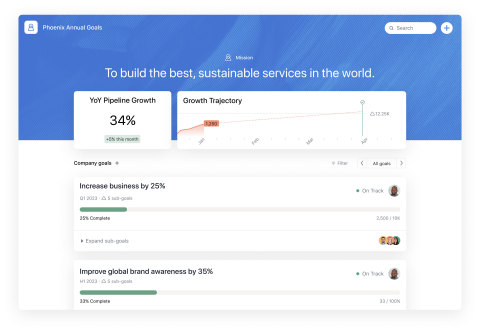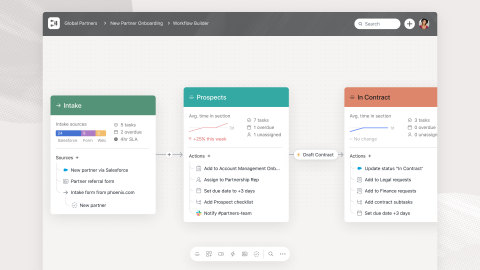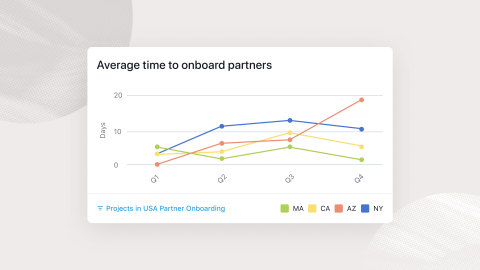Asana Enterprise Work Graph: Helping the World’s Largest Organizations Achieve Clarity in Unclear Times
Delivering a suite of capabilities to align global enterprise teams and streamline cross-functional work from anywhere
Asana, Inc., a leading work management platform for teams, announced the Enterprise Work Graph, a suite of new features giving even the most complex enterprises the clarity, flexibility and confidence needed to adapt to any business challenge. Combining the power of Asana’s proprietary Work Graph data model and new enterprise-grade security and controls, Asana aligns teams around goals; coordinates workflows across teams and timezones; and gives visibility into where work stands in real-time.

Companies of every size across all industries are losing countless hours to work about work – the time wasted on searching for information, switching between apps and holding status meetings. As enterprises grow, so does their work about work, with organizations of 5,000+ employees losing 63 percent of their time to it every week.
“Enterprises today are organized functionally but the reality is that work happens cross-functionally,” said Anne Raimondi, Chief Operating Officer, Asana. “The misalignment between how teams are organized and how work actually gets done is fueling work about work across organizations. With the Enterprise Work Graph, Asana is solving the universal challenges of cross-team coordination by providing the clarity teams need to stay connected, no matter where they are in the world.”
Recommended AI News: Infor Coleman AI Digital Assistant App Now Available For Microsoft Teams
Raimondi continues, “In today’s work from everywhere environment, the best leaders macromanage, not micromanage, their teams. By setting clear objectives connected to the work and the tools that bring them to life, enterprises can align effort and impact to achieve amazing results and increase employee happiness.”
Align Your Organization With New Goals
Asana’s Enterprise Work Graph drives alignment through visibility into how work connects with company objectives up, down and across an organization. Today, Asana is evolving its Goals offering with a new Goals API connecting goals with data and insights from mission-critical tools to monitor impact and inform executive decisions. With the Goals API, organizations seeking a holistic view of their goals in a single place, automatic progress updates and the ability to make changes to goals in their tools of choice can now achieve this programmatically by building custom integrations. For example, by linking an Asana goal to a CRM tool report, when sales teams close opportunities, the goal will automatically update in Asana keeping all stakeholders across an organization informed.

Coming soon, Asana will deliver automatic progress updates for Goals that provide real-time insights on the achievement of company objectives with no manual work needed.
Cross-Team Coordination Can Improve Your Business
Cross-team coordination today is chaotic with work living in team-specific silos and spreadsheets. Adding to the pain is that traditional process automation is a tops-down, IT-managed, expensive endeavor.

With Asana’s new Workflow Builder, anyone can create workflows, no coding required. This point-and-click tool builds and automates all the steps in a workflow and provides insights to optimize over time. The forthcoming Workflow Builder and Library will give teams the ability to create their own or leverage best-in-class, pre-built workflows to power projects and drive efficiencies. By helping teams scale processes across the organization, Asana eliminates the need for expensive tools and complex IT approvals.
Recommended AI News: The Trade Desk Launches New Advertising Partnership with Xiaomi
Visibility to Track Business Objectives
Asana’s Universal Reporting gives enterprises the visibility needed to track business objectives, make adjustments and guide teams to success, all without adding more meetings.

Inspired by the best practices of agile engineering teams who leverage velocity tracking to increase efficiency, Universal Reporting is being made even more powerful with the addition of reporting on data trends and workflows over time. From tracking budget spending across projects over days, months and years, to analyzing the amount of time teams are losing to inefficient processes, Universal Reporting over time will unlock powerful insights – helping even the most efficient teams continuously improve.
Scale with Security Measures For Growth
With the ability to support enterprises of 100,000 users and beyond, and an availability commitment of 99.9 percent, IT teams can focus on business outcomes as they scale, with the confidence that Asana will keep their data secure and available. With new Admin Announcements, IT can keep the entire organization updated directly in Asana to get the right information to the right teams at the right time. In addition, new SCIM functionality automates group set-up and synchronizes profile updates with Okta and, coming soon, Azure AD.

Today, enterprise admins can get insight into what happens in Asana via the Audit Log API and notifications on unusual activity. Coming soon, Enterprise Key Management (EKM) will give organizations even more control over their data by enabling them to bring their own keys to encrypt data. EKM gives enterprises visibility and control over access to their data, allowing the use of Asana for sensitive information while meeting enhanced security requirements.
“At Asana, we’ve designed our architecture over the past decade to support the scale and security needs of the world’s largest and most distributed organizations,” said Prashant Pandey, Head of Engineering, Asana. “From Enterprise Key Management to Audit Logs and an expanding ecosystem of partnerships with the world’s leading IT tools, we’re giving CIOs more control and flexibility to keep cross-functional teams connected, while ensuring data security.”
Recommended AI News: ESC Partners Forges Bond with Clouder Consulting
[To share your insights with us, please write to sghosh@martechseries.com]








Comments are closed.